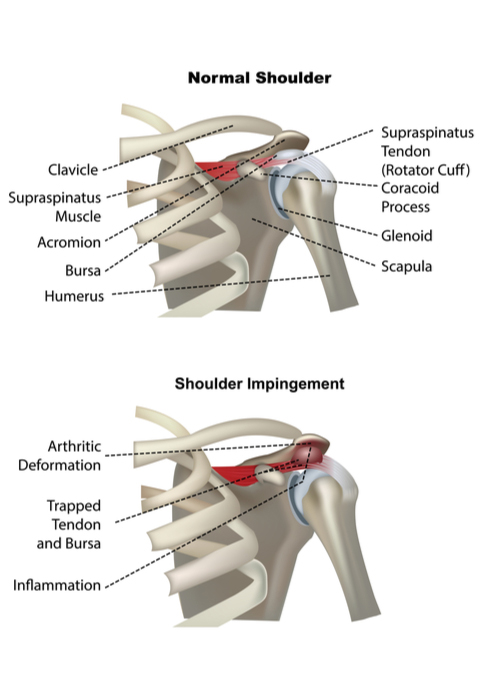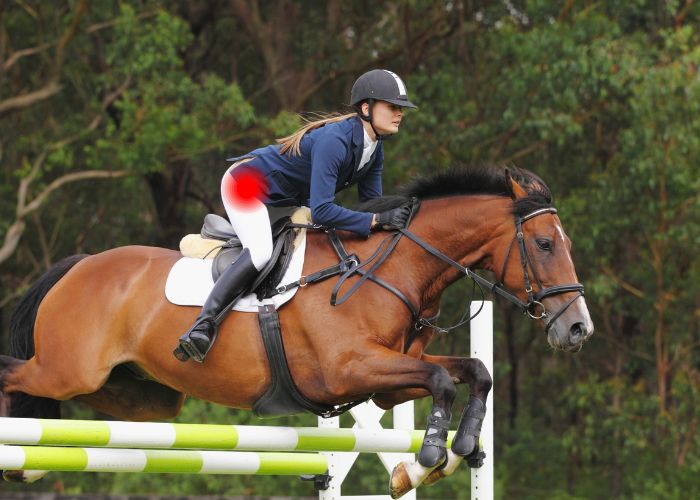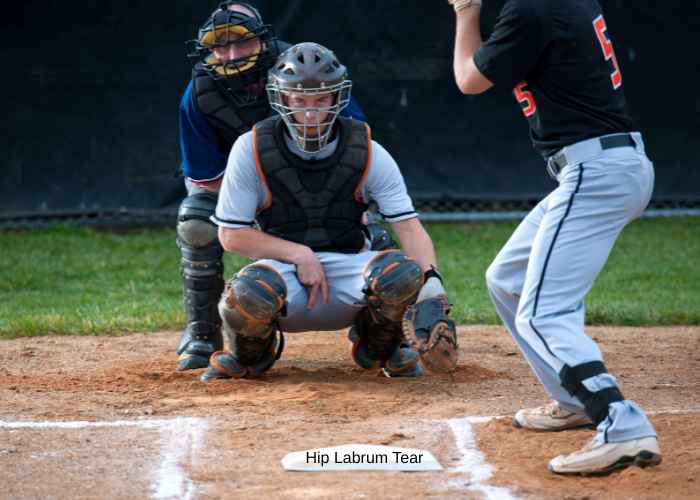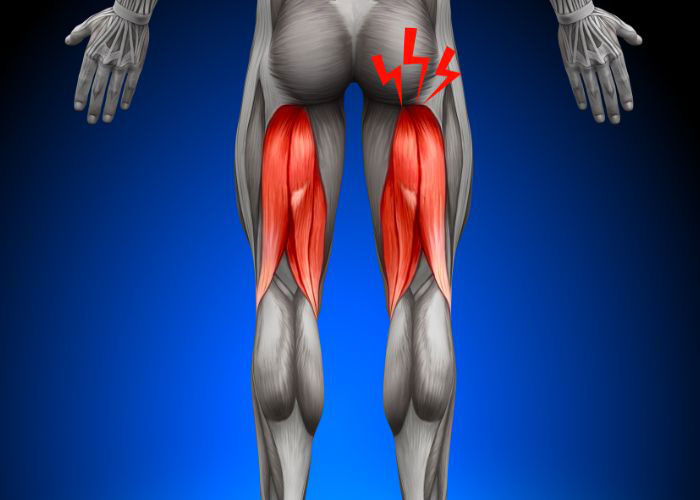What is shoulder impingement?
The top part of the humerus (upper arm) is covered by a group of four muscles and tendons known as the rotator cuff. This muscle and tendon group can rub against the acromion (highest portion of the shoulder blade) with overhead movements causing shoulder pain. Irritation of the rotator cuff from continual rubbing against the acromion can result in inflammation within the subacromial space and subsequent thickening of the tendons and bursae (fluid-filled sacs). When the rotator cuff tendons thicken, the amount of space available for tendon movement decreases resulting in shoulder impingement. This condition, also known as impingement syndrome or swimmer’s shoulder, is one of the most common causes of shoulder pain, which is caused by pinching of the tendon and bursae between the bones. Thickening of the tendons from continuous irritation can generate mechanical symptoms such as grinding, pinching, or rubbing sensations with certain shoulder movements. Dr. Ronak Mukesh Patel, orthopedic shoulder specialist serving patients in Sugar Land, Pearland, and the Houston, Texas area, has the knowledge and understanding, as well as substantial experience in treating patients who have experienced shoulder impingement.

What causes shoulder impingement?
Chronic shoulder use or repetitive overhead movements can result in shoulder impingement. Inflammation of the bursae (bursitis) can occasionally result from a minor injury. Shoulder impingement is a common condition among athletes that perform repetitive overhead motions in sports such as swimming, baseball, cricket, lacrosse, volleyball, and tennis. Individuals that work in construction, or someone who regularly lifts overhead as part of their job duties, are also susceptible to shoulder impingement.
What are the symptoms of shoulder impingement?
A dull and constant pain located near the clavicle (collarbone) is one of the most common complaints of shoulder impingement. Other common symptoms of shoulder impingement include:
- Sudden pain in the affected shoulder with reaching and lifting movements
- Sharp pain with activities involving reaching overhead or behind the back
- Shoulder weakness
- Radiating pain from the affected shoulder into the upper arm
- Loss of motion and strength of the affected shoulder
- Pain that worsens at night, especially with sleeping on the affected shoulder
How is shoulder impingement diagnosed?
If shoulder impingement is suspected, prompt medical attention is strongly encouraged as the tissue will continue to thicken with repeated shoulder use. This continued thickening can worsen the shoulder pain and possibly result in further damage to the rotator cuff. Patients can minimize the swelling and discomfort if treated early. A comprehensive medical history is obtained, and a thorough physical examination is performed by Dr. Patel to confirm a diagnosis of shoulder impingement. Diagnostic imaging, including x-rays and magnetic resonance imaging (MRI), may be requested to evaluate the other structures within the shoulder for any damage.
What is the treatment for shoulder impingement?
Non-surgical treatment:
Patients with a confirmed shoulder impingement diagnosis are generally able to recover with non-surgical therapies alone. Shoulder pain and inflammation can be reduced by eliminating activities that involve the shoulder as well as non-steroidal anti-inflammatory medications (NSAIDs). If the pain and inflammation are not relieved by oral medications, a corticosteroid injection can be administered directly into the subacromial space. A physical rehabilitation program will be prescribed by Dr. Patel once the pain and inflammation have subsided.
Surgical treatment:
In the event of unsuccessful non-surgical therapy, or if a patient experiences more severe inflammation or pain, Dr. Patel may recommend an arthroscopic subacromial decompression to increase the amount of available space for tendon movement. This minimally invasive procedure uses a small camera (arthroscope) to visualize the muscles, tendons, and ligaments of the shoulder. Any irregularities, such as bone spurs, inflamed tissue, or tendon tears, are removed and repaired with specialized surgical instruments. When performed correctly, the subacromial decompression procedure should eliminate further pinching of the tendons and bursae.
Shoulder Impingement Specialist

Do you work in a career that involves repeated overhead motion or lifting? If so, you are at an increased risk of developing shoulder impingement. Shoulder impingement can cause inflammation, irritation, and chronic pain when performing normal arm and shoulder movements. Complex shoulder specialist, Doctor Ronak Mukesh Patel, is experienced in diagnosing and treating patients in Houston, Sugar Land, and Pearland, TX who have experienced a reduced range of motion in the shoulder. To develop a personalized treatment plan, contact Dr. Patel’s team today!








